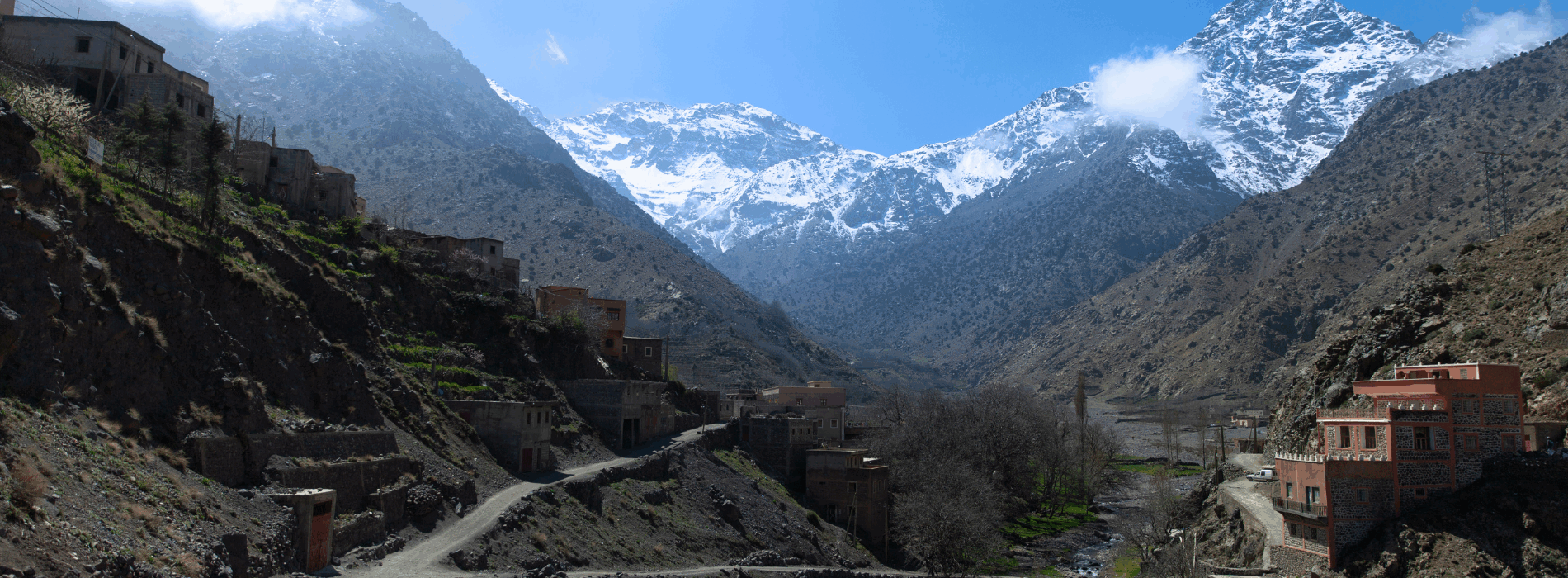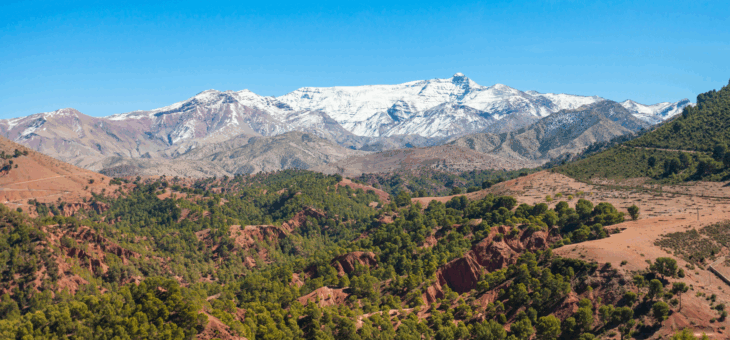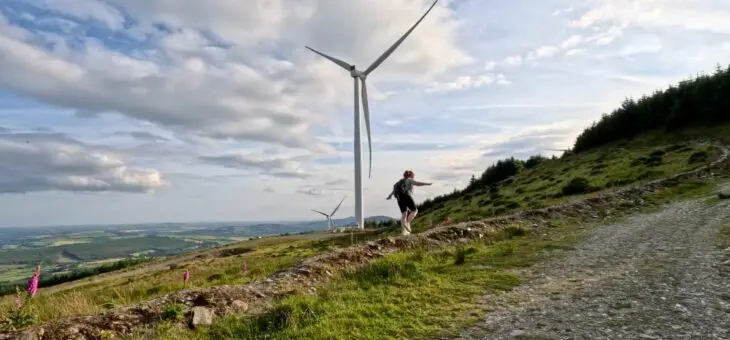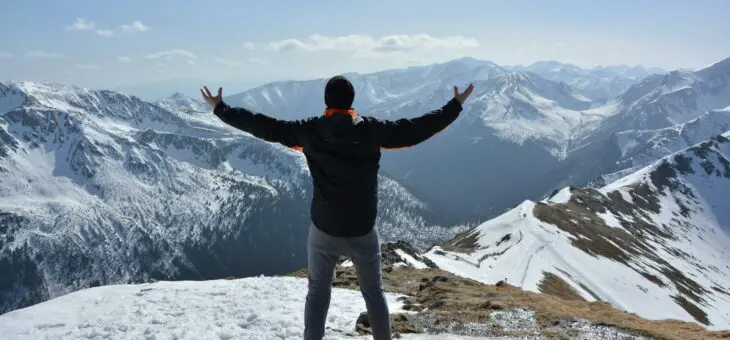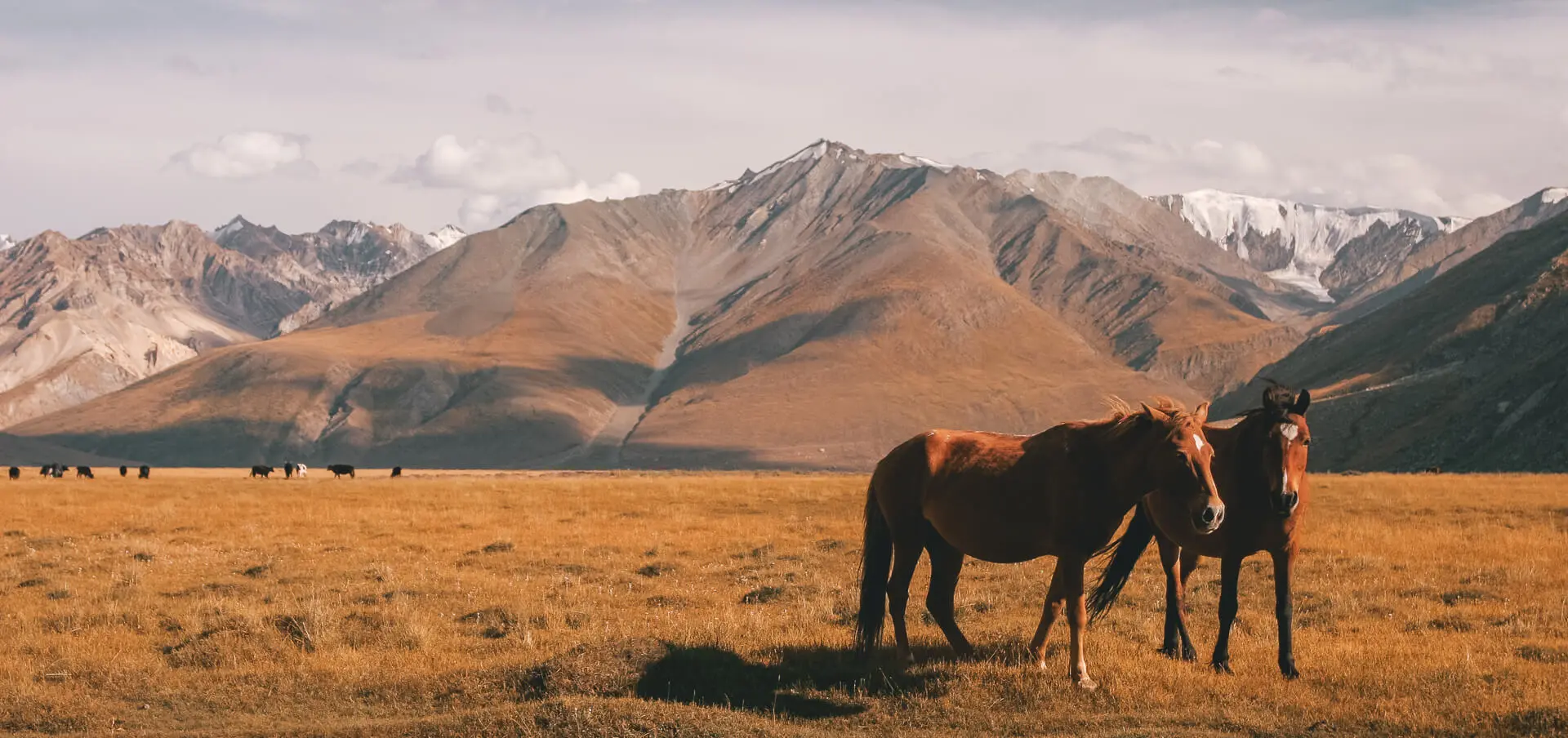Rising to 4,167m, Mount Toubkal in Morocco’s Atlas Mountains is the highest peak in North Africa and one of the most accessible high-altitude trekking summits in the world. But how hard is it really to climb Mount Toubkal? The answer depends on your fitness, preparation, and who you travel with.
This guide explains the Mount Toubkal difficulty level, breaks down what to expect, why it’s a great choice for first-time trekkers, and how to make the journey from Ireland to the summit a safe, memorable experience.
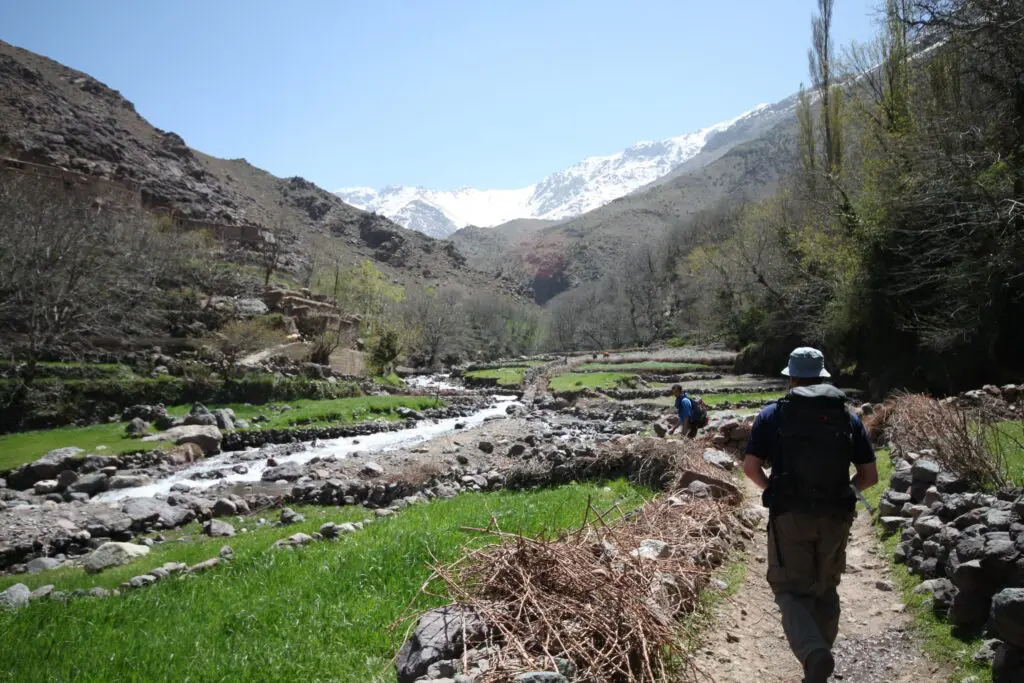
Is Mount Toubkal Suitable for Beginners?
In short – Yes! Mount Toubkal is one of the most beginner-friendly high-altitude treks in the world. It’s a non-technical climb, meaning you don’t need ropes or specialist mountaineering skills. And, outside of winter, you won’t need crampons or an ice axe either.
The main challenges are stamina and adjusting to the altitude, as you’ll be hiking above 3,000m for much of the trip.
You’ll be trekking over rocky trails, high passes, and occasional loose scree, but most fit hillwalkers can summit if they:
- Keep a slow, steady pace
- Listen to the advice of experienced guides
- Allow time for acclimatisation
- Sleep low, hike high
Our Mount Toubkal Circuit Trek is designed around all four of these points, making the challenge realistic for active beginners.
How Fit Do You Need to Be To climb mount toubkal?
While it’s beginner-friendly, the trek is still a challenge that requires preparation and a reasonable base level of fitness. You’ll be hiking for 5–7 hours on most days, with a long 8-9 hour summit day involving a steady uphill climb and a long descent back to Imlil. Some sections have steep scree and uneven terrain, but walking poles can help.
Proper preparation will make a huge difference to your overall enjoyment on the trek. We recommend at least 6–8 weeks of training before your trip, including:
- Long hikes (3–6 hours) on hilly or uneven terrain
- Consecutive days of walking to mimic trek conditions
- Strength work for legs and core
- Cardio sessions like cycling, running, or swimming
Our pre-departure training weekend in Ireland is a great way to prepare physically with two practice hikes, and get advice from an experienced expedition guide. Plus, you’ll get the chance to meet some of your fellow trekkers before you go.
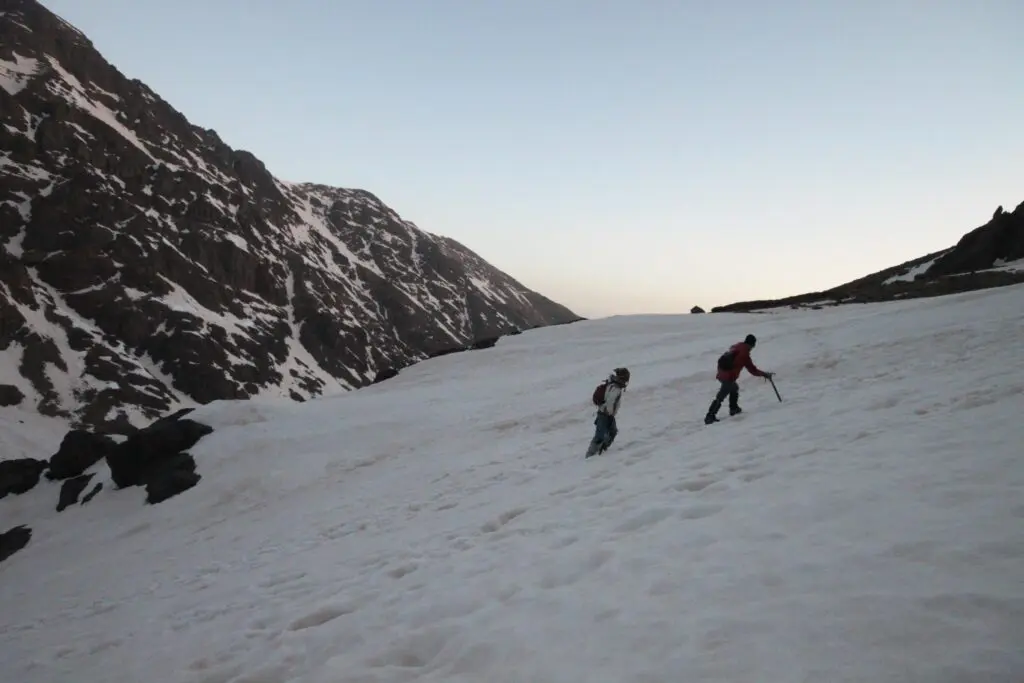
Mount Toubkal Altitude: What to Expect
At 4,167m, altitude sickness is a potential risk. Common symptoms include headaches, nausea, and fatigue. That’s why travelling with an experienced team and following a proper acclimatisation profile is essential.
The Mount Toubkal Circuit gradually builds height over six trekking days, which helps your body adapt. With Earth’s Edge, you also have a dedicated expedition doctor on the trek, so you have immediate medical support if you feel unwell at any point. This level of safety support is rare for Mount Toubkal treks, and it’s one of the reasons beginners feel confident joining our trips.
Why Earth’s Edge Trek the Full Mount Toubkal Circuit
When it comes to climbing Mount Toubkal, you have two main choices: the direct route (from Imlil straight to the summit and back) or the longer, more scenic Toubkal Circuit.
The direct route is faster, taking only 2-4 days, which suits trekkers short on time. But, it packs the altitude gain into fewer days, which can increase fatigue and the risk of altitude sickness.
We take the scenic circuit route: a gradual loop through remote Berber valleys, across high mountain passes, and past the turquoise waters of Ifni Lake before tackling the summit. This slower approach over 6 days isn’t just more beautiful, it also improves acclimatisation, spreads out the physical effort, and greatly increases your chances of reaching the top feeling strong.
How Earth’s Edge Make the mount toubkal Climb Safer and More Enjoyable
When you climb Mount Toubkal with Earth’s Edge, you benefit from:
- A doctor on every trip – unique for Mount Toubkal expeditions
- Small group sizes – usually 12–16 trekkers so you get plenty of personal support
- Expert local guides – offering cultural insights and local knowledge
- Mules to carry your gear – leaving you free to enjoy the trek
- All logistics handled – accommodation, food, and permits arranged
- Pre-departure training weekend – to get you ready for altitude and terrain, and ensure you have the right equipment for the climb
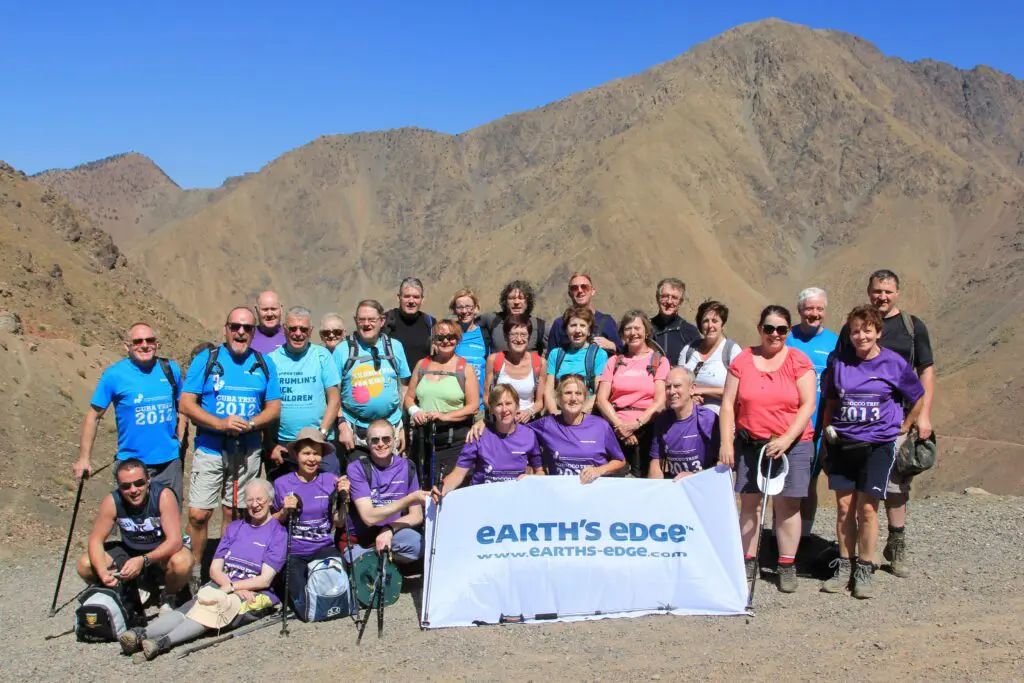
Final Verdict: How Hard Is climbing mount toubkal Really?
Climbing Mount Toubkal is challenging enough to feel like a real achievement, yet accessible enough for most healthy, active people, even if it’s your first big mountain.
With the right preparation and support, it’s the perfect introduction to high-altitude trekking and a gateway to bigger adventures.
If you’re in Ireland and looking for a safe, rewarding trek with stunning scenery, rich culture, and a summit over 4,000m that you can reach in under a week, Mount Toubkal is hard to beat!
Think you’re ready to take on Mount Toubkal? Read all about our NEW Mount Toubkal Circuit expedition!
If you’re still not sure, you can chat to one of the team here when you book your FREE 1:1 trip consultation!
You may also like to read our Complete Guide To Climbing Mount Toubkal From Ireland.
frequently asked questions about climbing mount toubkal
Can beginners climb Mount Toubkal?
Yes! Mount Toubkal (also called Jebel Toubkal) is one of the most beginner-friendly high-altitude summits in the world. It’s non-technical in summer, requiring no ropes or climbing experience. Good fitness, pacing, and gradual acclimatisation make the summit achievable for first-time trekkers.
How difficult is Mount Toubkal?
Moderate. Expect 5–7 hours of hiking most days, with a long 8-9 hour summit day over rocky trails and scree above 3,000 m. Preparation and a guided itinerary make the climb manageable even for first-timers.
Can I climb Mount Toubkal without a guide?
No. Since 2019, Moroccan law requires all trekkers in Toubkal National Park to be accompanied by a registered local guide. This is actually a big plus – not only does it make the trek safer, but your Earth’s Edge Morocco expedition leader will also share stories, history, and local culture along the way, making the journey even richer.
Do I need special equipment to climb Mount Toubkal?
No technical gear is required outside winter. You’ll need sturdy hiking boots, warm layers, and a daypack. Heavy gear is carried by mules on our treks.
